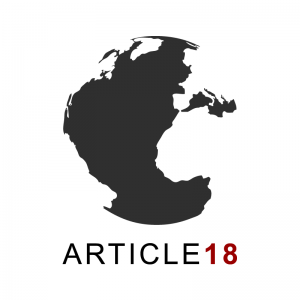By Martin Surridge – On Tuesday I returned from one of the most beautiful and enchanting countries in Southeast Asia–Thailand–a country known for its spicy cuisine, tropical mountainous rainforests, marvelous Buddhist temples, and the cosmopolitan city of Bangkok. But there’s much more to Thailand than the glossy posters in the travel agent’s window. 
This is Article18-RLTV’s weekly blog specifically dedicated to religious liberty issues in other countries around the world. Each week, we focus on a different nation, and the struggles facing one of its religious communities. This week: Thailand, where the Buddhist-majority government is under pressure from the international community to give more freedom to political dissenters and do more to prevent a violent Islamic insurgency along the Malay border.
While not technically a religious liberty issue, the trial of human rights defender and web forum moderator Chiranuch Premchaiporn is nevertheless a blow to those who wish to see a more free and progressive Thailand. If convicted, Premchaiporn, whose crime was hosting online material deemed offensive to Thailand’s monarchy, will be considered a prisoner of conscience by many including the global human rights organization Amnesty International. Benjamin Zawacki, Amnesty International’s Thailand specialist, said in a press statement that,
“Chiranuch should not be in the dock. The comments for which she is being held responsible should not be prohibited in the first place-much less when they are posted by someone else. Chiranuch’s arrest and trial reveal how far the Thai government is willing to go toward silencing unpopular or dissident views. [Her] case is significant because it threatens to ?shoot the messenger’ in addition to criminalizing the message. But it’s also just the latest in a series of attacks on freedom of expression in Thailand in recent years.”
In Thailand it is illegal to heavily critique or openly insult the national monarchy, who are so intimately connected to Theravada Buddhism that the issue is also a religious matter. And Premchaiporn’s case is not unique. Last month, 69 year old Surachai Damwattananusorn, a leader in the anti-government “Red Shirt” group, was arrested on lese majeste (insulting the monarchy) charges because of comments he made in a speech late last year.
The AFP explains that when it comes to lese majeste, “anyone can file a complaint, and police are duty-bound to investigate it in a country where the king is treated with almost religious adulation.”
The “religious adulation” that the AFP describes is not an exaggeration. Regardless of religion, each faith community in Thailand is required to recognize the king and queen as honorary members of their congregation and both Buddhist temples and Christian churches throughout the country hang a portrait of the king in their place of worship.
While the Thai government’s toleration for royal criticism is nearly non-existent, the country did receive some positive remarks in the U.S. State Department’s 2006 International Religious Freedom Report. The document states that Thai law…“provides for freedom of religion, and the government generally respects this right in practice; however, it does not register new religious groups that have not been accepted into one of the existing religious governing bodies on doctrinal or other grounds. In practice, unregistered religious organizations operate freely, and the government’s practice of not recognizing any new religious faiths has not restricted the activities of unregistered religious groups.”
The document continues to explain however, that the status of foreign missionaries in Thailand is monitored and that the government restricts the number of official missionaries entering the country.
In the southern region of Thailand, problems don’t revolve around the monitoring of foreign missionaries or insults directed toward the king, but rather a deadly, ongoing insurgency organized by Islamic militants near the Malaysian border. The Malay Muslim minority in the south of Thailand cite a “lack of respect for their ethnic identity, language and religion” as the reason for the recent bomb and gun attacks. More than 4,400 people have died in the region since 2004, including nine killed in a January bombing, four soldiers at a military base a week earlier, and two retired police officers this week.
The outlook for the region doesn’t look great, as the government in Thailand continues to grapple with the fallout from the global financial collapse, the continuing problems from the “Red Shirt” protests, and the aforementioned issues that continue to draw unwanted attention from the international community.
Later this week we will continue our profile of Thailand with an inspiring and more personal story from a small Christian village I visited in the heavily Buddhist mountainous region of Chiang Rai in Northern Thailand.
Article18 is a RLTV blog written by Martin Surridge, Associate Editor of Religious Liberty TV. Article18 logo created by Bradley Kenyon.